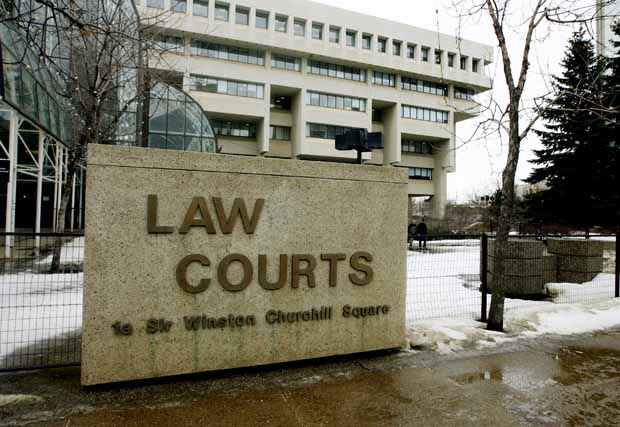EDMONTON – A lawyer for a teenager on trial for two murders says Mounties wasted time and money targeting a vulnerable youth in a poorly planned sting when they should have been looking for the real killer.

Mona Duckett argued in court Tuesday that the confession the youth made to undercover officers — who he believed were part of a criminal gang — should not be used as evidence.
The Crown responded by saying police didn’t coerce or intimidate the boy into a confession.
Barry Boenke, 68, and his friend Susan Trudel, 50, were found bludgeoned and shot to death on a rural property east of Edmonton in June 2009.
Duckett said RCMP made a quick arrest and, when the case fell apart against the teen and a co-accused two years later, officers forged ahead with an undercover charade that took advantage of the accused’s vulnerabilities.
Duckett said it’s a shame the grieving families of the victims still have no answers.
“This operation is a product of tunnel vision by the investigators,” Duckett told the judge, who is hearing the case without a jury.
“It was a predictable disaster.”
The day before Boenke and Trudel were killed, the accused and another boy — both 14 at the time — had run away from the Strathcona County Ranch, a youth treatment facility run by Bosco Homes. The boys had been sent to the group home for allegedly vandalizing a school.
The two were arrested after they were found driving Boenke’s stolen truck. The accused confessed to police, but during pretrial hearings a judge ruled the statement inadmissible. Without that key piece of evidence, the Crown stayed murder charges.
There was no forensic evidence linking the boys to the killings. Their DNA was not found at the scene and there was no blood or gunshot residue on their clothes. The gun that killed Boenke and Trudel has not been recovered.
RCMP later targeted both boys separately in an undercover “Mr. Big” sting. The accused was in Edmonton and the other teen in Calgary. Last May, the Crown reactivated the case against one teen and charged him with two counts of second-degree murder.
The suspect, who turns 18 in a couple of weeks, is being tried as a youth and cannot be identified.
He admitted to undercover officers that he killed Boenke and Trudel to be part of what he thought was a powerful crime syndicate. But he testified during the trial that he lied to gain respect.
The other boy also changed his story on the witness stand. He told undercover Mounties he saw the accused teen kill Boenke and Trudel, then testified he and the other youth were on the property but never actually saw the victims.
Duckett argued the two “kids” had many reasons to lie to the fake gangsters. The boys were basically homeless with no education or jobs and were being offered money, support and friendship. She said the undercover officers took her client — 16 at the time — to his first rock concert, to his first Oil Kings hockey game and on his first trip to the mountains.
He also had access to a condo. Officers supplied him with cigarettes and, on one occasion, beer.
Duckett said the accused has mental deficiencies and has been described by experts as a “social pleaser.” Court heard he has Tourette’s syndrome, attention deficit hyperactivity disorder and some aspects of fetal alcohol spectrum disorder. He was also sexually abused as a child by an uncle, she said.
Prosecutor William Wister told court that social services miserably failed the accused teen as he was growing up, “but the child-welfare system is not on trial here.”
He said the teen may have low intelligence, but was able to do math in his head and carry on conversations with undercover police. Wister argued the sting was not coercive, did not involve violence and the teen always had a choice to leave.
Duckett said the bottom line was that the boy just wanted money for his mom. The estranged parent had addictions and was in an abusive relationship and he wanted to help her move, the lawyer said.
The undercover sting amounted to an abuse of power by police, Duckett suggested. She said her client, a permanent ward of the government, bragged to officers about his affair with a married female counsellor at a youth detention centre.
He was being sexually exploited and officers didn’t help — they continued with the undercover operation, she said.
Court of Queen’s Bench Justice Brian Burrows shot down several points the Crown made, including a suggestion that the teen wasn’t really homeless because he could have called a social worker at any time. The judge said the condo offered by police was “pretty darn attractive” compared with living with family or in another group home.
The judge said he was also troubled over why RCMP conducted the sting in the first place. “Right from the start, police knew he had all the information they had.”
Wister said Mounties set up the sting hoping that they would be led to forensic evidence and, although they never did, they did get a confession.
Officers testified during the trial they didn’t know how much the sting cost. Duckett estimates it was about $205,000.
“Was the benefit worth the cost? Not at all — far, far from it.”
The judge reserved his decision to May 10.

Comments